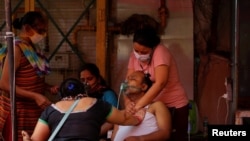The United States is imposing new travel restrictions on India starting Tuesday because of the devastating wave of COVID-19 cases across the south Asian nation.
President Joe Biden's administration made the determination on the advice of the Centers for Disease Control and Prevention, according to White House Press Secretary Jen Psaki.
"The policy will be implemented in light of extraordinarily high COVID-19 caseloads and multiple variants circulating in India," Psaki said Friday.
The restrictions will bar most non-U.S. citizens in India from entering the United States, according to the Reuters news agency.
The United States already has similar travel bans in place for most non-U.S. citizens who have been in other coronavirus hot spots within the past 14 days, including South Africa, Brazil, Britain, Ireland, the European Union, China and Iran.
U.S. citizens in India will be allowed to fly home, but like all international travelers flying into the United States, they will be required to show proof of a negative coronavirus test or recovery from COVID-19.
The CDC also recommends that all international travelers get a COVID-19 test three to five days after arriving in the United States and quarantine themselves at home for at least seven days, even if they test negative for the virus.
Other countries, including Britain, Germany and Singapore, have imposed similar travel restrictions on India.
On Friday, India reported 386,452 new coronavirus cases, the ninth day in a row that the country has exceeded 300,000 new cases. Indian media reports said some public health experts believe the actual tally of new infections may be at least five times higher.
India on Friday also reported 3,498 deaths in the last 24 hours, bringing the country's official death total to 208,330.
Aid from the United States and other countries arrived Friday in India. U.S. assistance included oxygen supplies, rapid diagnostic tests and vaccine manufacturing materials.
The second wave of the coronavirus in India has overwhelmed the country's health care system, with hospitals at full capacity and an acute shortage of oxygen aggravating an already desperate situation. Many parks and parking lots have been converted into makeshift crematories that are working day and night.





